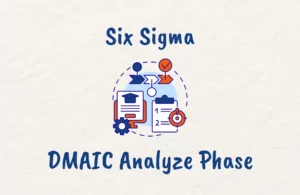In the project management and agile software product development world, to enhance productivity through collaboration, project or agile teams need to be as fluid and cross-functional as possible.
This way, It becomes easy to use different roles interchangeably, and it’s quite common for the terms Scrum master and business analyst to be used to imply the same thing.
Now while both of these roles have some overlap in the required skills and knowledge for both roles, they happen to be quite distinct roles and each serves different purposes within organizations.
It’s important to understand the differences between both these roles to ensure the right people are in the right places on your project team to enhance the chances of a successful project.
This article provides an insight into the roles and responsibilities of the Scrum master and the business analyst, and the key differences between these roles, including their focus, skills, and deliverables.
The Role and Responsibilities of A Scrum Master
A Scrum master is an integral part of an agile team and plays a critical role in the success of the team.
For the team to successfully deliver the needed business value in a timely and efficient manner using a Scrum framework, the Scrum master has an essential role to play.
A Scrum master helps a Scrum team to follow the Scrum framework by facilitating the Scrum events or ceremonies. They act as a servant leader for the team with the goal of ensuring the team meets its commitments and deliver value.
The Scrum master is to work closely with the team and ensure that the Scrum framework is religiously followed and that every team member understands their roles and responsibilities.
For every project, there are bound to be obstacles and impediments that come up during the life cycle. It’s the job of the Scrum master to remove these impediments by resolving issues or obtaining resources needed to ensure that the team stays focused on the goal.
Also, the Scrum master helps the team to improve its processes and practices by coaching the team in Scrum values and principles, and facilitating meetings and discussions.
To do all of these effectively, the Scrum master first of all needs to have a strong understanding of agile principles and the Scrum framework, and possess strong coaching and communication skills to impart this knowledge to the team and the organization by extension.

The Role and Responsibilities of A Business Analyst
In an Agile team, the business analyst plays a crucial role as a bridge between the stakeholders and the development team. They’re to ensure that the project meets the needs of the stakeholders and delivers the expected business value.
The role of a business analyst is primarily to collect the business requirements for a project or business and document them.
In order to do this when working with an Agile team, they need to work closely with the Product Owner and stakeholders to fully comprehend their needs, goals, and vision.
After collecting the business requirements from the stakeholders, the business analyst needs to translate them into clear and concise user stories that the development team can understand and work on to create value that satisfies the business need.
To ensure that the project progresses as desired and stays on track, the business analyst plays a key role in facilitating discussions and decision-making within the team.
During the project, the business analyst is also responsible for the modeling and analysis of the project’s data and business processes. This can be done by visualization of the process with diagrams and flowcharts to identify areas for improvement.

Scrum Master Vs Business Analyst
Something you need to understand is that there is no official business analyst role in Agile Scrum according to the Scrum Guide.
Despite the absence, it doesn’t invalidate the need for the duties of a business analyst and these may have to be done by another role that is officially recognized during Agile projects.
The closest to the business analyst role in an Agile project is the Product Owner who has the responsibility of managing the product backlog and translating requirements to user stories.
However, in a lot of projects, you may likely see a shift of these duties to the Scrum master. This is the origin of the overlap of roles and the interchangeable use of Scrum master and business analyst roles.
Despite this overlap, as earlier iterated, the roles of the Scrum master and a business analyst are distinct and serve different purposes for projects.
To have a clearer idea of the distinction between these roles, note that the Scrum master’s primary responsibility is ensuring the team adheres to the Scrum framework through guidance and facilitation.
Another key responsibility of the Scrum master is helping the team deal with roadblocks and impediments to their progress, and fostering collaboration and effective communication for transparency.
The business analyst on the other hand is primarily concerned with the business needs and gathering the requirements for a solution for that need.
Between the stakeholders’ vision and the project team’s product vision lies a gap that needs a bridge. The business analyst has to translate the stakeholders’ needs to the development team so they build a product that satisfies them.

What is the Difference Between Scrum Master and Business Analyst?
Having highlighted a distinction between the primary roles of the Scrum master and a business analyst, we go further to elucidate 5 key differences between these roles in focus, skills, roles, responsibilities, and interaction with the team.
1. Focus of Work
The focus of the Scrum master is directed at ensuring the team is working according to the Scrum framework, and facilitating the Scrum events in order to fully reap the benefits of Scrum.
They work with the development team with their focus centered on ensuring that the team follows the Scrum principles and framework, and all Scrum events hold according to the Scrum framework.
The business analyst’s focus is on understanding the business needs and facilitating the development of solutions to these needs.
They work with the development team closely with a focus centered on the solutions being developed and ensuring it meets the business needs.
2. Skills Required
The skills required for these roles also differ. A Scrum master needs in-depth knowledge of the Scrum framework and the agile methodology.
The required skills include coaching, effective communication, mentoring, facilitation, and collaboration. They need to be adept at leadership and motivation and possess the ability of problem-solving when roadblocks to the project.
A business analyst on the other hand requires a background in business analysis and knowledge of the business domain they work in.
They require in-depth skills in gathering and documenting business requirements, data analysis, and an ability to develop solutions to business needs.
3. Decision-Making Authority
When it comes to making decisions during projects, there’s a difference in the roles played by the Scrum master and business analyst.
The Scrum master is responsible for facilitating the decision-making process and ensuring that the team remains aligned with the sprint goal. They don’t however have the authority to make decisions on behalf of the team.
The business analyst also doesn’t have the authority to make decisions, but they may provide input from the gathered requirements and analyzed data which are important in making decisions.
4. Roles and Responsibilities
One of the primary differences between a scrum master and a business analyst lies in their role and responsibilities within the team.
A scrum master is responsible for facilitating the scrum process and ensuring that the team adheres to the principles and practices of Scrum.
This includes facilitating daily stand-up meetings, helping the team define and refine user stories, and removing any obstacles that may be blocking the team’s progress.
On the other hand, a business analyst is responsible for gathering and documenting business requirements, analyzing the needs of the business, and identifying solutions to problems.
They work closely with the development team to ensure that the solution being built meets the needs of the business and aligns with the overall project goals.
5. Career Paths
Transitions are pretty common when it comes to business and technology and with the right training and acquisition of relevant skills, anyone can develop careers in Scrum or business analysis.
However, traditionally the career paths of a Scrum master and business analyst tend to differ. Scrum masters often come from a technical background before they transition into the role.
Also, it is common for Scrum masters to have backgrounds in software development, project management, software testing, and agile coaching.
Business analysts on the other hand typically have a background in business analysis or a related field, such as finance or management consulting.
They may have experience in data analysis or business process improvement before transitioning into the role of business analyst.

Is a Business analyst a Part of Scrum?
Business analysts are often involved in scrum projects, but they aren’t considered a part of the scrum team in the traditional sense.
According to the Scrum Guide, the scrum team consists of the development team, the product owner, and the scrum master.
The development team is responsible for delivering the product, the product owner is responsible for defining the features and priorities of the product, and the Scrum master is responsible for facilitating the Scrum process and removing any obstacles that may be hindering progress.
While business analysts aren’t typically considered a part of the scrum team, they may be involved in the project as stakeholders or subject matter experts.
They may work closely with the development team to gather and document business requirements, analyze the needs of the business, and identify solutions to problems.
They may also be involved in the decision-making process and work with the product owner to prioritize features and requirements.
Who is Paid More Scrum Master or Business Analyst?
When choosing a career, there are many factors to consider such as interests, skills, and availability of opportunities. However, we all know that money is important in this world and always will be.
When it comes to the earnings of Scrum masters and business analysts, it’s difficult to generalize about the relative pay of scrum masters and business analysts, as salaries can vary widely based on factors such as industry, location, and level of experience.
In general, however, business analysts tend to have a higher level of education and specialized skills, and may therefore command higher salaries than scrum masters.
According to data from Glassdoor, the median salary for a business analyst in the United States is $74,986 per year, while the median salary for a scrum master is $96,542 per year.
However, it’s important to note that these figures are just estimates and may not accurately reflect the salaries of individual scrum masters and business analysts.

Read Also: Who Determines How Work Is Performed During The Sprint?
Can Scrum Master switch to Business analyst?
It’s very possible for a Scrum master to transition into a business analyst role, although this may require some additional education and training.
Scrum masters and business analysts have different skills and expertise, and a Scrum master may need to develop additional business analysis skills in order to be successful as a business analyst.
Some of the skills and knowledge that a Scrum master may need to develop in order to transition into a business analyst role include:
- Understanding business domains and processes
- Gathering and documenting business requirements
- Analyzing data and identifying patterns
- Developing solutions to business problems
- Communicating effectively with stakeholders
In order to develop these skills, a Scrum master may need to pursue additional education, such as a business analysis certification or a degree in a related field. They may also need to gain practical experience through internships or entry-level business analyst positions.

Is Scrum Master Certification useful for Business Analysts?
A Scrum Master certification may be useful for a business analyst in certain circumstances, but it isn’t typically a requirement for the role.
Business analysts are responsible for gathering and documenting business requirements, analyzing the needs of the business, and identifying solutions to problems.
They typically have a background in business analysis or a related field, such as finance or management consulting, and may hold a business analysis certification or a degree in a related field.
While a Scrum Master certification may not be a requirement for a business analyst, it can still be beneficial in certain circumstances.
For example, if a business analyst is working on a project that uses the Scrum framework, having a Scrum Master certification may help them better understand the process and how to work effectively within the framework.
Additionally, a Scrum Master certification may demonstrate a strong understanding of agile methodologies and the ability to work effectively in an agile environment, which could be valuable for a business analyst.
Conclusion
In summary, a Scrum master is primarily focused on facilitating the agile development process, while a business analyst is focused on gathering and analyzing business requirements and identifying solutions to business problems.
Both roles are important for the success of an agile development team, but they have different areas of focus and expertise.
While the Scrum framework doesn’t have a role for business analysts, they can however be combined on a variety of operations and projects.





